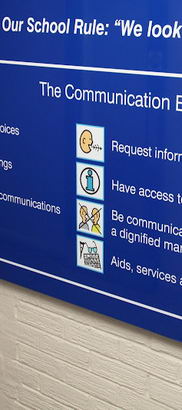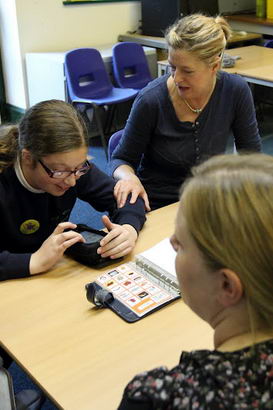
Building on the Every Child Matters (2003) agenda, Removing Barriers to Achievement presented a long-term ambitious programme of sustained action and review locally and nationally, focusing on:
- Early intervention.
- Removing barriers to learning (embedding inclusive practice).
- Raising expectations and achievement (training).
- Improvements in partnership.
This mandate to strengthen collaborative working hinges on effective communication.
Removing Barriers to Achievement: The Government's Strategy for SEN, DfES, 2004
The Bercow Report (2008) highlighted the patchy provision for children with speech, communication and language needs (SCLN). Many families describe support for their children with SCLN as a 'postcode lottery'. Despite the hard work of professionals many children's needs are not met.
The Bercow Report (2008) also includes sections on the following themes, all of which will relate directly to the communication strengths of staff.
- How to improve understanding that communication is crucial.
- How to ensure that early identification and intervention are recognised as essential.
- How to design a continuum of services around the family.
- How to promote more and better joint working.
- How to ensure greater consistency and equity for families.
The Bercow Report (2008): Communication – a 'postcode lottery'

Some things you can do in response to the Bercow Report:
- Find out the satisfaction of families in your school with service provision regarding communication. Review minutes from review meetings, and include communication as an item for teachers to discuss with parents at a consultation.
- What do parents and carers perceive to be their support needs both for their child, and for themselves as communicators with their child?
- Explore how your school could work more closely with individual families.
- Are there any urgent advocacy issues or common themes that need to be pursued?
- What do you actively do to promote the confidence of parents in you school to meet their child's complex needs? Do you have an evidence base?
- What use do you make of parents' views – have you evidence of response to information you receive?

The Lamb Inquiry (2009) main findings are all related to the effectiveness of communication between professionals and parents. The implication is that many parents consider professionals to be poor communicators. This needs to be taken up by senior managers as a training issue for staff in communicating with families.
Read the Lamb Inquiry and review your school's communications with families in the light of the
main findings.
Communication – an issue for partnership (1)
-
 Video 100:52Sophia's special school class teacher indicates her communication potential in a presentation of her progress
Video 100:52Sophia's special school class teacher indicates her communication potential in a presentation of her progress -
 Video 203:38The mainstream staff express concern over Sophia's social inclusion and their awareness of over-reliance on staff support
Video 203:38The mainstream staff express concern over Sophia's social inclusion and their awareness of over-reliance on staff support
Watch the extracts from the annual review of Sophia, who has a split placement two days a week in a mainstream school and three days at a special school.
Communication – an issue for partnership (2)
-
 Video 301:46A key issue for the partnership is identified, concerning resourcing for Sophia's communication across settings
Video 301:46A key issue for the partnership is identified, concerning resourcing for Sophia's communication across settings -
 Video 402:58The targets agreed by those present aim to reconcile Sophia's abilities across settings
Video 402:58The targets agreed by those present aim to reconcile Sophia's abilities across settings
Watch the extracts from the annual review of Sophia, who has a split placement two days a week in a mainstream school and three days at a special school.
Consider the following issues in relation to the clips you have watched:
- How do the parents' views contribute to agreed aspirations for taking forward Sophia's communication?
- How are Sophia's parents' views received by the professionals? Do you think the parents feel valued and respected? Reflect on the inter-personal skills of the professionals.
- What do you think might be professional development implications for the mainstream and special school teachers working with Sophia and her family, and their respective class teams?
- Consider how you could use the clips for leading CPD within your school with regard to developing parent participation. What inter-personal skills could you highlight?

Department for Education and Skills. (2003) Every Child Matters. London. HMSO.
Training and Development Agency (2008) Undergraduate SEN Training Toolkit.
DCSF (2008) The Bercow Report: a review of services for children and young people (0-19) with Speech, Language and Communication Needs. Nottingham: DCSF Publications.
DfE (2009) The Lamb Inquiry: Special educational needs and parental confidence.